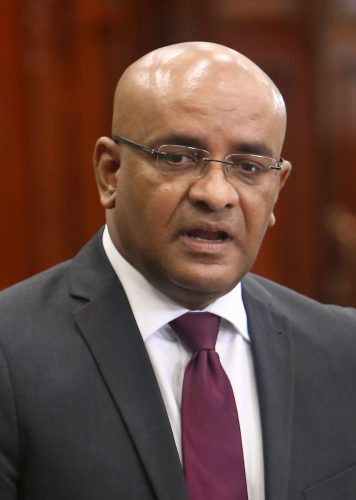Government recently introduced five financial bills in Parliament with the hope of having them passed just in order to satisfy World Bank conditionalities for a US$35 million loan, says Leader of the Opposition Bharrat Jagdeo.
“The US$35 million loan that you have seen being touted as money coming in to help with the oil and gas framework, that loan has several World Bank conditionalities.”
The conditionalities are contained in a World Bank document titled, Guyana First Programmatic Financial and Fiscal Stability Development Policy Credit Project, dated June 22, and which may be found online on the World Bank’s website.

It would be helpful, Jagdeo said at a press conference on Thursday at his Church Street, Queenstown office, for the business community and the private sector to view the bills which are before the Parliament in Finance Minister Winston Jordan’s name, and the World Bank’s document.
The bills include the Financial Institutions (Amendment) Bill, the Bank of Guyana (Amend-ment) Bill, the Deposit Insurance Bill, and the National Payment Systems Bill,
The first of the World Bank conditionalities which deals with “Operational procedures being in place to undertake resolution with modern tools including purchase and assumption options,” Jagdeo said, is related to the terms of liquidation of banks. “There are conditionalities relating to the procedures for banks being wound up which is part of the legislation and it also has to deal with deposit insurance schemes.”
Others conditions include, “Operational procedures in place to undertake resolution with modern tools including purchase and assumption options. Emergency short term liquidity facilities activated and in place, and subject to eligibility for solvent but illiquid banks with sufficient collateral. All licensed insurance companies meet the phased target of the new solvency requirement. Cashless transaction through interbank facility.”
The conditionality, “The number of the Financial Intelligence Unit (FIU) intelligence reports referred to police for money laundering investigations,” Jagdeo said, is telling Government that 20 cases must be reported. “Imagine the World Bank telling the FIU how many cases they have to submit to the police for money laundering investigations before they access the US$35 million” by June 2020.
Another conditionality is having the Sovereign Wealth Fund in place. “We need a conditionality to get on with the Sovereign Wealth Fund.”
The development of an appraisal system that ranks and prioritises public sector investment projects is another conditionality.”
Jagdeo said, “When you think that this money is coming in and that it is condition-free and that the World Bank is helping out, they in fact are steering our Ministry of Finance in a particular direction.”
The amendments to the current laws, he said, may not be suitable for the local economy or they may need longer phasing in periods even if they have to give the Central Bank tools to face any eventuality like a bank failure.
“You have to look at the local circumstances. I suspect many of these things were drafted by external consultants. We may very well push up transactions costs, push up the cost of credit because the banks have to have a particular level of coverage of their deposits by a certain date and the costs will be passed on to the consumers.”
Meanwhile, an International Monetary Fund staff report which he obtained on Friday morning, Jagdeo said, “is ringing some bells about our future and the state of our economy.”
According to the report, he said, credit to the business sector in Guyana grew by 0.9 percent in 2017, there is a high level of non-performing loans, and a large exposure as a percentage of capital.”
Some of the countries assessed, he said, have average exposure as a percentage of capital at about 20 per cent while Guyana’s average is about 160 per cent of capital.
Although the IMF says that the US$30 billion that Government is raising is to restructure the sugar industry, Jagdeo said, “We have seen the Government describing it as for long term capital projects.”
He added, “That needs to be clarified. I gather they are in the market today for the remaining $13 billion. They have raised $17 billion already.”
He noted that the IMF also spoke of the moral hazards of tax amnesties.
“We should ask the heads of the Guyana Revenue Authority to publish all the write-offs that are being given to people, companies, not how much they paid but how much they write off and for whom.”
The IMF, he said, also noted Government’s “expenditure increasing rapidly.” He said the most worrying thing is the overdraft from the Central Bank to fund Govern-ment’s budget which the IMF said must be paid back urgently.
“We thought it was $55 billion. From what we gather it is over $100 billion.”




